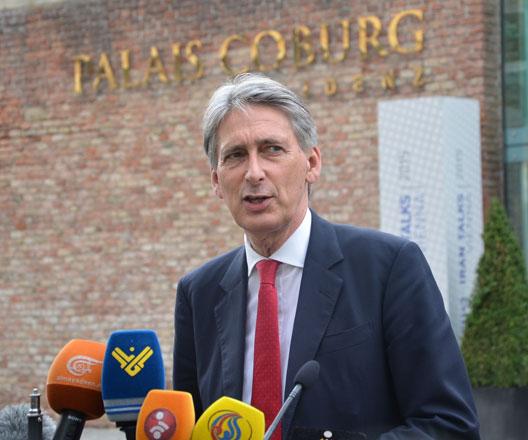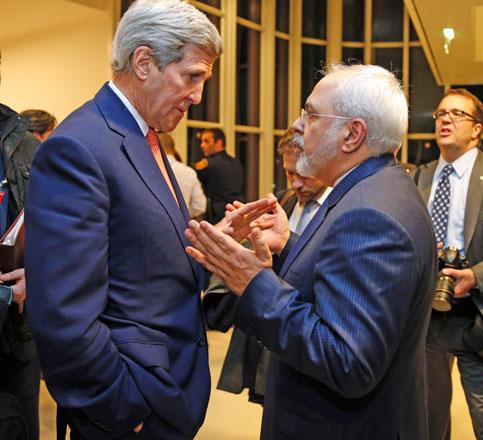You are here
With historic nuke deal in sight, US and Iran dig in
By AP - Jul 14,2015 - Last updated at Jul 14,2015
VIENNA — A historic nuclear compromise within sight, American and Iranian negotiators struggled Monday to clear the final obstacles to an agreement aimed at eliminating the threat of a nuclear-armed Tehran. Weary diplomats expected to push past their fourth missed deadline in less than two weeks.
Among the vexing questions remaining: Should Iran be allowed to begin buying and selling conventional weapons again?
As a midnight target for a deal approached, diplomats said the nuts and bolts of the written nuclear accord had been settled days ago. And Iranian President Hassan Rouhani briefly raised expectations of an imminent breakthrough by proclaiming on Twitter: “Iran Deal is the victory of diplomacy & mutual respect over the outdated paradigm of exclusion & coercion. And this is a good beginning.”
But only minutes later, Rouhani’s tweet was deleted. He then retransmitted it, adding the word “If” in front of “Iran Deal” to reflect that negotiators weren’t there yet — just the latest reversal on a day of seesaw changes that started with high hopes for an agreement. The proposed pact would impose long-term and verifiable limits on Iran’s nuclear programme and provide the Islamic republic tens of billions of dollars in relief from international sanctions.
At the White House, press secretary Josh Earnest said the talks were “making genuine progress”, and the American negotiating team under Secretary of State John Kerry would remain in Vienna as long as the negotiations advanced. If a deal wasn’t reached Monday, he said, the 20-month-old provisional constraints on Iran’s enrichment of possible bomb-making material and other nuclear activity would remain in force as the diplomacy continued.
The exact length of the extension to the current round of talks, already in its 17th day, wasn’t immediately clear.
As of Sunday, diplomats had spoken of reaching a complete agreement within hours, only to then say the final sign off would have to come over the next 24 hours. But as Monday evening arrived in Austria’s capital and a small number of differences persisted, the talk again moved to an accord the following day.
“No deal on Monday, nuclear agreement possible on Tuesday,” Iran’s state-run Press TV said in a bulletin attributed to Iranian Foreign Minister Mohammad Javad Zarif.
One dispute that was proving particularly troublesome was Iran’s status under a UN arms embargo, the future of which wasn’t clearly defined when world powers and Tehran reached a framework deal in April.
A US statement issued at the time said the final agreement would result in “the comprehensive lifting of all UN Security Council sanctions” on Iran, which could be interpreted to include the arms embargo. But the US also said at the time that “important restrictions on conventional arms and ballistic missiles” would be incorporated in any new UN guidelines for Iran.
Washington wants to maintain the ban on importing and exporting weapons, concerned that an Iran flush with cash from the nuclear deal would expand its military assistance for Syrian President Bashar Assad’s government, Yemen’s Houthi rebels, the Lebanese militant group Hezbollah and other forces opposing America’s Mideast allies such as Saudi Arabia and Israel.
Iranian leaders say the embargo must end as their forces are combating regional scourges such as the Daesh terror group. And they’re getting support from both Russia and China, who want at least a partial lifting of the restrictions. Moscow, in particular, hopes to expand military cooperation and arms sales to Tehran, including the long-delayed transfer of S-300 advanced air defence systems — a move long opposed by the United States.
In Iran, state TV said the full text of the 100-page nuclear agreement was already written, but “needs to be edited carefully since even a single misplaced comma may change everything”. A diplomat familiar with the talks dismissed the report as inaccurate, however. The diplomat wasn’t authorised to speak publicly on the status of negotiations and demanded anonymity.
Diplomats reported at least two other issues beside the arms embargo eluding agreement: How to finalise a long-stymied UN investigation of alleged nuclear weapons work by Tehran and Iran’s demand that any UN Security Council resolution approving the broader deal no longer describe Iran’s nuclear activities as illegal.
On the International Atomic Energy Agency’s probe, the Iranians insist they have never worked on weapons and top Iranian officials say military sites and nuclear scientists are off-limits to investigators. On the legality of its programme, it hopes to receive positive recognition of its diplomatic effort with the six world powers on the other side of the negotiating table — with a quick lifting of UN sanctions without the stain of being adjudged in violation of the Nuclear Nonproliferation Treaty.
With another extension appearing the only viable option, some diplomats expressed exasperation.
“There should not be an extension in the talks,” Zarif said in remarks carried by Iran’s official IRNA news agency. Later, from the balcony of the ornate manor-turned-hotel hosting the talks, he told reporters that negotiators are “sleepy and overworked”.
Related Articles
VIENNA — Iran and six major powers will keep negotiating past Tuesday's deadline for a long-term nuclear agreement as they tackle the most c
Iran’s President Hassan Rouhani defended Tuesday a landmark nuclear deal with world powers that promises modest sanctions relief, saying his government did not fear “the few” domestic critics.
TEHRAN — The US and Iranian presidents on Sunday hailed the implementation of Tehran's nuclear deal as historic, but new American sanctions


















